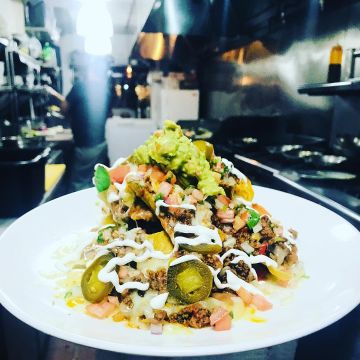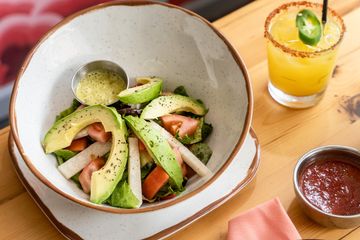Is Mexican Food Healthy? Unloading the Nutritional Perks of Typical Components
The concern of whether Mexican food is healthy welcomes an exploration of its standard ingredients. Beans and corn act as foundational staples, abundant in healthy protein and fiber. Avocados give helpful fats, while different natural herbs and spices add taste and health and wellness benefits - happy hour. With each other, these elements create a tapestry of nourishment. Nevertheless, the healthfulness of Mexican cuisine frequently depends on prep work approaches and section dimensions. What duty do these aspects play in establishing its overall nutritional worth?
The Power of Beans: Protein and Fiber-Rich Staples
Although typically forgotten, beans serve as a foundation of Mexican cuisine, supplying a wealth of dietary benefits. Rich in healthy protein, they are an outstanding plant-based option for those seeking to meet their nutritional protein requires. This high healthy protein content sustains muscular tissue fixing and growth, making beans indispensable for both vegetarians and meat-eaters alike. In addition, beans are an outstanding resource of nutritional fiber, which aids in digestion and advertises a sensation of volume, possibly assisting with weight management.
The selection of beans made use of in Mexican meals, such as black beans, pinto beans, and kidney beans, adds to a varied taste profile and can boost meals nutritionally. Beans are reduced in fat and include vital vitamins and minerals, including magnesium, folate, and iron. With each other, these characteristics make beans a crucial active ingredient, providing both nutrition and nutrition in typical Mexican fare.

Corn: a Versatile Grain With Nutritional Perks
Corn sticks out as a functional grain fundamental to Mexican food, celebrated not only for its culinary applications yet likewise for its impressive dietary account. As a primary component in meals like tortillas, tamales, and pozole, corn provides necessary nutrients that add to a well balanced diet regimen. Rich in carbs, it works as a substantial energy resource, while additionally being reduced in fat, making it a beneficial alternative for various nutritional demands.
Corn is a great source of nutritional fiber, which aids in food digestion and promotes satiety. It has substantial quantities of vitamins such as B-complex vitamins, which are vital for power metabolic process. The existence of anti-oxidants, particularly carotenoids, adds to overall wellness by minimizing oxidative stress and anxiety. Furthermore, corn is gluten-free, dealing with those with gluten level of sensitivities. Overall, the nutritional advantages of corn underscore its value in standard Mexican food and its role in a healthy diet regimen.
Avocados: Healthy Fats and Nutrients in Every Bite
Avocados play a considerable duty in Mexican cuisine, matching meals with their velvety appearance and abundant taste. Beyond their cooking appeal, avocados are celebrated for their impressive dietary account. They are a rich resource of healthy and balanced monounsaturated fats, which can help reduced bad cholesterol levels and assistance heart health and wellness. In addition, avocados are packed with crucial nutrients, including potassium, vitamin E, and B vitamins, contributing to general health.
The high fiber content in avocados help digestion and promotes satiation, making them a helpful enhancement to any kind of dish. Their special nutrient composition can also support skin health and give anti-inflammatory advantages. Integrating avocados right into conventional Mexican recipes or enjoying them as a standalone snack can boost both flavor and nutrition, showing why they are a beloved staple in Mexican cuisine. Generally, avocados offer a tasty means to enjoy healthy fats and critical nutrients in every bite.

Herbs and spices: Flavorful Health And Wellness Boosters
While delighting in the rich flavors of Mexican cuisine, one can not forget the essential role that spices and natural herbs play in boosting both preference and wellness. Active ingredients such as oregano, chili, and cilantro peppers not only add to the vibrant taste account however also give significant wellness advantages. Cilantro is understood for its detoxing properties, aiding to remove hefty metals from the body, best mexican westchester NY while oregano is loaded with antioxidants and possesses anti-inflammatory results.
Chili peppers, a staple in numerous Mexican dishes, include capsaicin, which has been linked to improved metabolic rate and discomfort relief. In addition, seasonings like cumin and coriander assistance food digestion and might assist in blood sugar level guideline. Integrating these savory health boosters into dishes not just improves the cooking experience however additionally advertises total health, making Mexican food not simply scrumptious, but likewise nutritionally advantageous.
Conventional Food Preparation Approaches: Enhancing Nutrition and Flavor
Typical cooking techniques in Mexican cuisine play a necessary duty in boosting both nutrition and taste, as they commonly focus on fresh components and classic techniques. Strategies such as nixtamalization, where corn is saturated and cooked in an alkaline service, not only enhance the nutrient account of tortillas yet also improve their digestibility - happy hour. Additionally, making use of slow-moving cooking techniques, like cooking or braising, permits tastes to meld magnificently while retaining the stability of the components

Regularly Asked Concerns
Are Mexican Food Portions Commonly Larger Than Various Other Foods?
Mexican food sections are commonly bigger than those of lots of other foods. This characteristic reflects traditional eating techniques, emphasizing public sharing and hearty meals, which can lead to an extra considerable serving dimension generally.
Exactly how Does the Prep Work Method Affect Healthfulness of Mexican Food?
Preparation approaches substantially influence the healthiness of Mexican food. Strategies such as grilling or steaming protect nutrients, while frying can increase harmful fat web content. Choices of components and cooking styles ultimately determine total nutritional value.
Can Mexican Food Be Tailored for Particular Dietary Limitations?
Mexican food can without a doubt be customized for details nutritional limitations. Substitutions, such as using corn tortillas for gluten-free diet regimens or integrating even more vegetables, allow individuals to appreciate standard tastes while accommodating numerous nutritional requirements.
What Prevail Misunderstandings About Mexican Food and Health And Wellness?
Typical misconceptions about Mexican food include the idea that it is inherently undesirable, extremely spicy, and exclusively concentrated on fats. In truth, traditional meals usually feature healthy ingredients and can be tailored to various nutritional requirements.
Are There Healthier Options at Mexican Restaurants?
Healthier options at Mexican restaurants often include grilled meats, beans, and fresh vegetables. Choosing recipes that highlight entire ingredients and staying clear of heavy sauces can lead to an extra nourishing dining experience, advertising total well-being.
The variety of beans used in Mexican dishes, such as black beans, pinto beans, and kidney beans, adds to a varied flavor account and can boost dishes nutritionally. Avocados play a substantial duty in Mexican food, complementing dishes with their velvety structure and abundant taste. Integrating avocados into conventional Mexican dishes or appreciating them as a standalone snack can boost both flavor and nourishment, showing why they are a precious staple in Mexican cuisine. While delighting in the rich tastes of Mexican cuisine, one can not ignore the important role that spices and herbs play in improving both preference and health and wellness. Conventional cooking methods in Mexican cuisine play an essential function in boosting both nutrition and taste, as they frequently focus on time-honored techniques and fresh active ingredients.